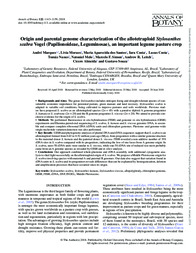Origin and parental genome characterization of the allotetraploid Stylosanthes scabra Vogel (Papilionoideae, Leguminosae), an important legume pasture crop.
Origin and parental genome characterization of the allotetraploid Stylosanthes scabra Vogel (Papilionoideae, Leguminosae), an important legume pasture crop.
Author(s): MARQUES, A.; MORAES, L.; SANTOS, M. A. dos; COSTA, I.; COSTA, L.; NUNES, T.; MELO, N. F. de; SIMON, M. F.; LEITCH, A. R.; ALMEIDA, C.; GUSTAVO SOUZA, G.
Publication year: 2018
Types of publication: Journal article
Observation
Some of Embrapa's publications are published as ePub files. To read them, use or download one of the following free software options to your computer or mobile device. Android: Google Play Books; IOS: iBooks; Windows and Linux: Calibre.
Access other publications
Access the Agricultural Research Database (BDPA) to consult Embrapa's full library collection and records.
Visit Embrapa Bookstore to purchase books and other publications sold by Embrapa.

